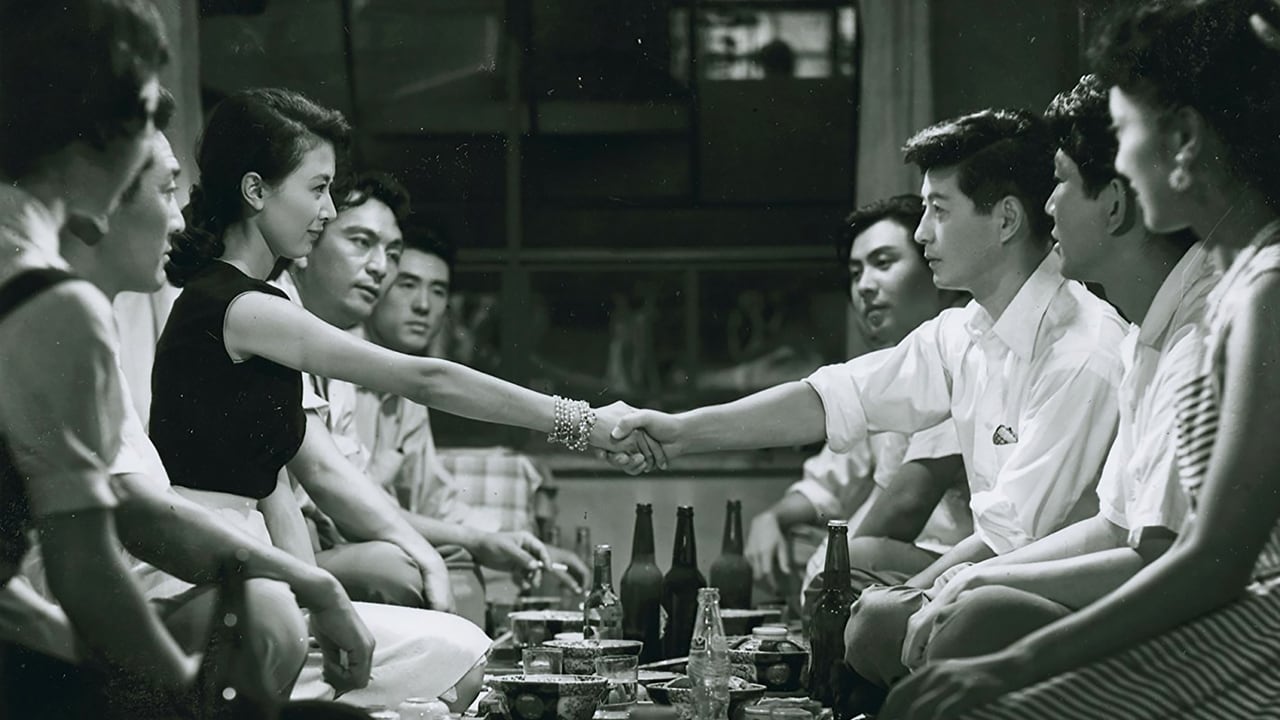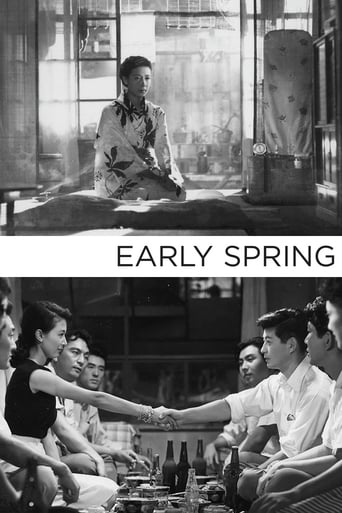

I think this is a new genre that they're all sort of working their way through it and haven't got all the kinks worked out yet but it's a genre that works for me.
... View MoreBad Acting and worse Bad Screenplay
... View MoreIt's complicated... I really like the directing, acting and writing but, there are issues with the way it's shot that I just can't deny. As much as I love the storytelling and the fantastic performance but, there are also certain scenes that didn't need to exist.
... View MoreThe performances transcend the film's tropes, grounding it in characters that feel more complete than this subgenre often produces.
... View MoreOkay, so we expect a certain clarity from cinema about the conundrums of life. In Ozu this appears in a combination of things. The spatiotemporal eye is empty, grounded, it's a dispassionate awareness that sets the room for life to play out. It's more than realism, it's a way of creating realization about the point things are more sensibly viewed from.Narrative then is a matter of having something to view. Here several things blend. Officework for the salaryman in the audience. War reminiscence. A marriage grown distant to illustrate the tension in the home. So each of these threads poses an aspect of life, the idea is that life also extends a bit in this or that direction. This is the opportunity to create that realization that in the first place informs the passage of time. It's not that things were better in the old days, this is never the point in his films. Viewers who miss this are stuck with a sentimental uncle. It's that things are not different, that slightly changed the same conundrums repeat: salarymen are not more distinguished than the old craftsmen, husbands will stray as before and so on. In the same swoop it creates both melancholy and a certain kind of relief.Ozu is quaint then in this sense of being content by the way life envelops and figures itself out, letting the drama peter out as a way of saying it was never worth being caught in. This was most elegantly seen in Early Summer in the girl's spontaneous decision one night to marry. Here the wife in the end makes her choice to follow her husband in his transfer, not because anything has been solved, but because it is now seen to not matter.But he removes the self from the camera only to put it back in the characters. This is a great and difficult balance that to my mind he only accomplished once or twice, how little to show and say. There's no precise answer, just different brushstrokes to try. Push with a little more force and it becomes a moral smudge, push less and maybe there won't be an intelligible trace.Ozu traces faintly the turmoil but too hard the worldly lesson, it seems every minor character is encountered to offer advice at some point. It defeats the whole point of a world that is not yet figured.
... View MoreI consider Yasujiro Ozu one of the worlds most significant and distinctive directors, a man who eschews false dazzle in favor of examining the human condition, human relationships; most of his films are quietly incisive portraits of people coming to conclusions and making decisions which will permanently affect their lives. Ozu imparts subtlety to his characters, his sense of time and place are impeccable, and his respect for his characters unparalleled. All of that said, I think that Early Spring is one of his least effective--one easily sees the point he makes about corporate behavior and marital infidelity, but this one, rather than quietly contemplative, struck me as merely slow. The characters too often lack any redeeming qualities, and yet we are apparently supposed to care about them for more than two hours, difficult when there is so little to work with--Early Spring is certainly not a stinker, by any means, but for me, a lesser Ozu, and if you want to start with something more characteristic, begin with either version of Floating Weeds, or with his masterpiece, Tokyo Story.
... View MoreI have seen quite a few of Yasujiro Ozu's films and while I enjoyed this film, it is not among his best--mostly because of its sluggish pacing. If the film had about 20 minutes cut from it, I really think it would have worked better. Now I am not against long films--provided they merit the additional time. This is one of the few Ozu films I had to force myself to finish, as I found it hard to concentrate on what was occurring--a first for one of his films.The film is set in a Japanese company where there are lots of lower to mid-level drones doing their jobs. The theme, at times, is that no matter how hard you work and devote yourself to your job, you will one day die...and most likely not appreciated or sufficiently recompensed for your hard work. A depressing view, to be sure, as the film was apparently trying to make a point about alienation during the industrial age (a common theme in Ozu films).In addition to this theme, there is another plot involving one of the workers having an affair with a co-worker. What actually made this pretty interesting and poignant is that the man's marriage was already in trouble, as their son had died several years ago (as a small child) and the couple became distant in the aftermath. Also interesting is the reaction of the man's co-workers when they think they've discovered the affair (though they still aren't sure). The men all seem to condemn them very quickly and say this is disruptive to the company. BUT, they also later sound incredibly envious of the couple! Additionally, instead of confronting both of them, they only invite in the woman---an interesting double standard.Overall, the film is typical in style to what you'd expect from an Ozu film. The camera remains stationary and slightly lower than the actors and there are no lens movements. Instead, scenes change by cuts, not by a roving camera. Also, the film's subjects are the countless lower-level white collar workers. Atypical is the film's slow pace (slow even for Ozu) as well as the subject matter--adultery is not something he talked about often.So is it worth seeing? Well, anything by Ozu is worth seeing as far as I am concerned. Just don't expect quite the same magic and poignant moments like you'd find in such classics as FLOATING WEEDS or LATE SPRING.
... View MoreSoshun aka Early Spring (Yasujiro OZU, 1956)This was made after a more than two-year gap following his preceding film, "Tokyo Story" (during which period he spent a lot of time working on a film that was to be directed by Kinuyo Tanaka -- which had become bogged down by all sorts of business politics). Ozu re-visits the world of the young "salaryman" for the first time since the 30s -- and doesn't particularly like what he finds. Ozu looks at the corrosive impact of the transition to a corporation-centered existence on white collar working men.Shoji Sugiyama (Ryo IKEBE) and Masako (Ckikage AWASHIMA) have been married around 7 or 8 years, but are childless (their only son having died several years earlier). Shoji has shifted his focus to his career and pretty much disregards his wife (or at least takes her very much for granted). After Shoji becomes involved in dalliance with a co-worker, Chiyo, better known as "Goldfish" (Keiko Kishi), Masako decides she's had enough...This film is one of Ozu's most earnest. While there are some touches of humor (for instance, Shoji's reunion with his army buddies, after which he is followed home by two of them), the overall tone is serious. Kumeko Urabe provides some earthy practicality as Masako's mother (now a noodle shop vendor -- unclear what she did prior to her husband's death years before) and Chishu Ryu (as Shoji's mentor, in business exile in the boondocks -- but not entirely regretting it) provides quasi-paternal guidance.This film teaches a message Japan largely ignored, business relationships are not an adequate substitute for family ties. With the recent recognition (in Japan) of the phenomenon of "death by overwork", the message of the film might be considered especially timely.
... View More